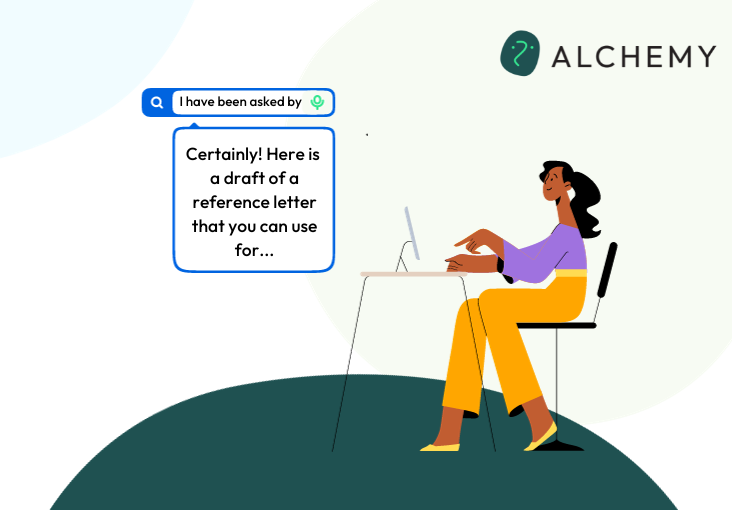Article
Using AI to Assist with Letters of Recommendation

Among the myriad roles that college faculty fulfill, one of the most impactful yet often understated is writing letters of recommendation – particularly toward the end of the academic year. This task extends beyond mere administrative duty, embodying a profound service to students excelling in their academic and professional pursuits. Whether for graduate school, a job, or a promotion, these letters are more than just formal endorsements; they are catalysts that can propel deserving students toward the next stage in their professional journey. Through personalized and thoughtful recommendations, faculty members not only acknowledge the hard work and achievements of their students but also play a pivotal role in shaping their future opportunities.
However, the task of writing letters of recommendation can be one that can feel arduous or like an overload task, given they are often requested near the end of a term when assessment, grading, and other deadlines are looming. Luckily, a little bit of Generative AI can go a long way to streamline the process while still expressing the personal connections and endorsements desired. Using Generative AI, such as ChatGPT, need not seem like making it impersonal. After all, the focus of the letter of recommendation should not be on the writing process itself but the output as an effective representation of ways in which the candidate is being endorsed.
Create A Request Intake Form
For faculty inundated with requests for letters of recommendation, such as those teaching large gateway courses or serving in an advisory capacity, efficiency is key. An effective solution is to implement a simple, yet comprehensive online intake form for students to complete. This form streamlines the process by gathering essential information such as academic achievements, extracurricular involvements, and specific attributes the student wishes to be highlighted. It also collects information related to the desired outcome (e.g., graduate school acceptance, job, promotion), as well as the recipient who will be considering the applicant. If you would, you can feel free to adopt or adapt the following form to fit your needs in this process.
The benefits of this approach are twofold: it ensures that the letter addresses relevant aspects of the student’s profile, and it helps faculty members manage their workload. Additionally, maintaining a spreadsheet of these requests not only aids in tracking the volume and status of recommendations but also serves as a valuable record of student accomplishments and aspirations. Such an organized system proves invaluable for faculty committed to supporting their students’ success in an effective and orderly manner. It can help to grow your network of recent graduates, which can elevate visibility of your program in the field, as well as provide you with a running list of individuals you can have speak to students in your courses about their experience in the field or give advice as they consider their next steps beyond the program.
Implementing AI to Draft Letters of Recommendation
At Alchemy, we have developed a Teaching Optimizer (i.e., AI-enabled template) to help you quickly and effectively draft letters of recommendation. The Optimizer will help you take key elements regarding the applicant and align them to the desired outcome. AI performs very well in terms of formal yet descriptive writing, putting it into a professional format, and propping up appropriate salutations. Our Optimizer is ready to assist you in this important process and role you serve to support your students going to the next level. It is housed on Curie, our technology platform for educators, along with over 60 other interactive Teaching Optimizers.
Conclusion
Through employing our Optimizer, the amount of communications and time elapsed can be significantly reduced, minimizing any anxiety – for both parties – about being able to complete the process in time. Leveraging a request form facilitates from the outset and adds continued benefits for the sponsoring instructor and department in tracking professional outcomes of their students. Utilizing our AI-enabled Optimizer can efficiently support all of these outcomes while retaining the personalized essence of the recommendation.
Access Curie for free and explore our library of resources and interactive Teaching Optimizers designed to save you time in enhancing your courses. Simply enter your institutional email to get started.



